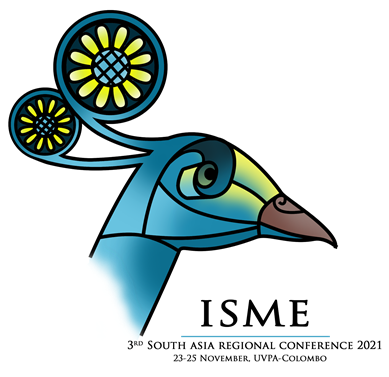
International Society for Music Education
Promoting Intercultural Understanding through Music Transmission in South Asia
3rd South Asian Regional Conference
23rd -25th November 2021
What is ISME.
- ISME stands for International Society for Music Education.
- ISME is affiliated to the International Music Council and UNESCO.
- ISME has members in more than ninety countries.
- ISME is the premiere international organization for Music Education.
- ISME respects all music and all cultures.
- ISME believes that every individual has a right to Music Education.
More Information about ISME: https://www.isme.org/
About the Conference
Theme: Promoting Intercultural Understanding through Music Transmission in South Asia
South Asia is a region of great diversity. This diversity should be widely respected and nurtured. Although living standards are based on increasing economic outputs, some critical voices should be heard that have to balance the place of music learning, that have to deal with the facts of oral traditions, in primary schools as well as in other types of schools and learning/teaching institutions. This conference may have to re-define a number of issues such as public and private music education, name their goals, and question some basic assumptions of educational principles applied to regionally diverse communities.
Proposals for individual papers presentations, panel sessions (symposia), workshops and multi-media presentations are invited from participants worldwide. ISME encourages submissions from researchers and practitioners at all career stages including students and early career professionals that align with the conference theme and the needs and aspirations of music education throughout the region.
VENUE
Virtual Conference
Faculty of Music
University of the Visual and Performing Arts
Colombo
DATE
November 23- 25, 2021
Committees
Conference Steering Committee
Conference Chair
- Sandra Oberoi (ISME Board Member & ISME Advocacy Committee Chair)
Conference Co-Chair
- Saman Panapitiya (Dean of the Faculty of Music, UVPA)
- Kaushalya Navaratne (Sevalanka, Srilanka)
- Chinthaka Meddegoda
- Iranga Weerakkody
- Charudaththe Illangasinghe
Scientific Committee
- Chinthaka Prageeth Meddegoda, University of Visual and Performing Arts, Colombo
- Heidi Westerlund (University of the Arts Helsinki, Finland)
- Danielle Treacy (University of the Arts Helsinki, Finland)
- Solveig Korum (Kulturtanken, Norway)
- Iman Shah (Nepal Music Centre, Nepal)
- Robert Lindon Tavis Ashton-Bell (Christ – Deemed to be University, India)
- Natalie Serrazin (SUNY at Brockport, USA)
- Bindu Subramanian (SaPa, India)
- Adam Greig (KM Music Conservatory, India)
- Gisa Jähnichen (Shanghai Conservatory of Music, China)
- Rohan Nethsinghe (University of Canberra, Australia)
Event Sponsors
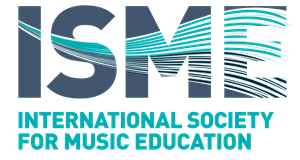
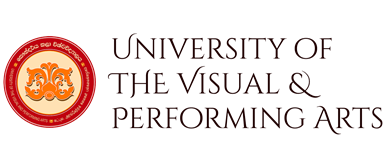
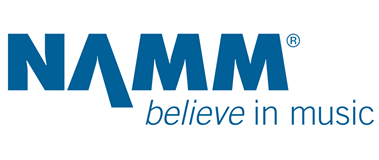
Keynote Speakers
Emily Achieng’ Akuno
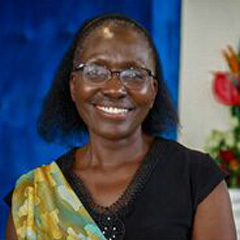
Emily Achieng’ Akuno is Deputy Vice Chancellor (Academic Affairs) at The Co-operative University of Kenya. She holds a Doctor of Philosophy degree from Kingston University, Surrey, UK, a Master of Music of the Northwestern State University, Louisiana, USA and Bachelor of Education (Arts) of Kenyatta University, Kenya. Prof. Achieng’ Akuno has over 30 years University level Teaching, Research and Administration experience. She has served in various senior and middle level management capacities here in Kenya and abroad, including Kenyatta University, Maseno University and the Technical University of Kenya and the University of KwaZulu-Natal in Durban, South Africa.
Trained as a performer-educator, Prof. Achieng’ Akuno is actively involved in the music and music education scene in Kenya and internationally. An astute researcher currently working on a music for literacy development project, she is widely published and read with over 40 academic works in refereed journals, books and conference proceedings.
Prof. Achieng’ Akuno is the current ISME President and a former President of the International Music Council.
Gisa Jähnichen
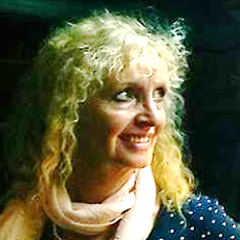
Gisa Jähnichen, Prof. Dr. (Ecomusicology, Performance Practices of Asia) at Shanghai Conservatory of Music, Chair of the ICTM Study Group on Musical Instruments, Secretary of the IASA T&E Committee, Ambassador of IASA to Malaysia and China, Vice President of the RILM MIXTE Commission, and Member of the DeCoSEA Project, also teaching at Guangxi University of the Arts, Vienna University, Humboldt University Berlin, and as consultant at the National Library of Laos.
She studied at Charles University, Prague, Humboldt-University Berlin, and Vienna University. Her many writings and editions are widely published and are accessible online and in libraries around the world.
Rohan Nethsinghe
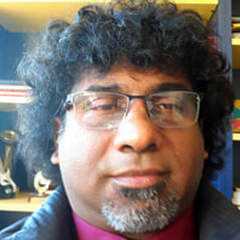
Laureate of international Jazz music festivals and competitions Dr. Rohan Nethsinghe from University of Canberra, Australia is an Assistant Professor in Creative Arts Education, Visiting Professor at the University of Visual and Performing Arts, Sri Lanka and Christ Deemed to be University, Bangalore, India. Rohan has more than thirty years of performing, teaching and researching experience in international contexts and has worked as a musician (at the Donetsk State Academic Opera and Russian Ballet Theatre), teacher in Australian schools (p-12) and in higher education sector (Technical and Further Education institutions and Universities). As a phenomenologist Rohan publishes in scholarly journals and presents his research internationally in the areas of Creative Arts Education, STEAM, Music Education, Arts Education and Higher Education. His research in Multicultural Music Education has contributed to the enhancement of the scholarship in teaching and learning and Rohan has won several prestigious awards for his research in teacher education.
Call for Papers
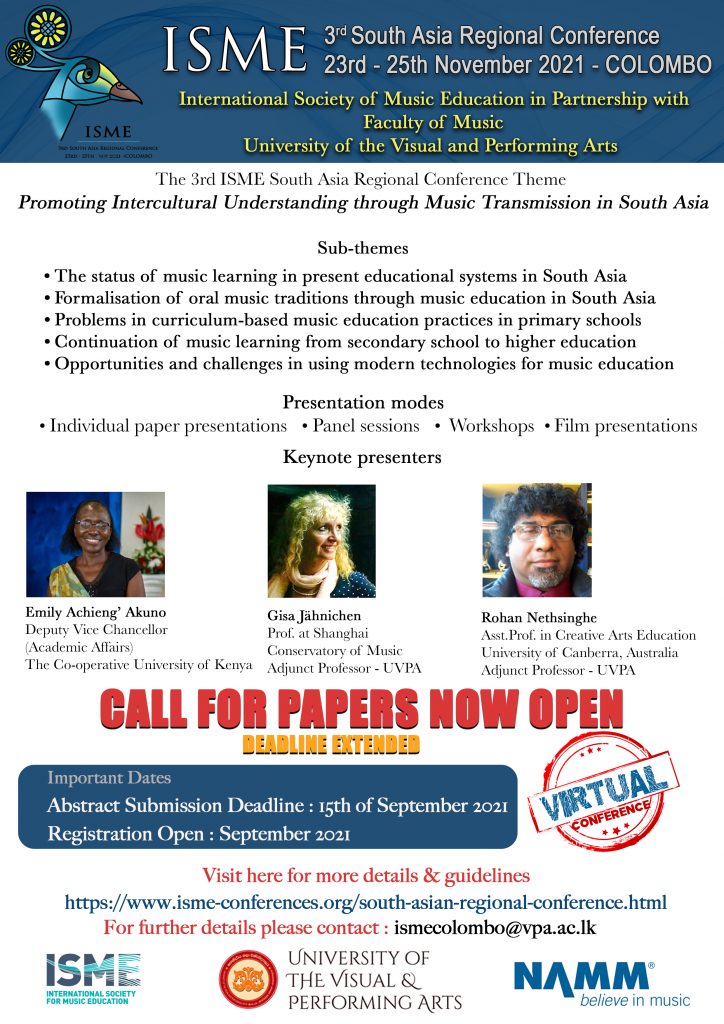
Presenter Information
Conference Theme: Promoting Intercultural Understanding through Music Transmission in South Asia
The main theme could be broken down in to five further subtopics that focus on key aspects of the theme that speak most close to the needs and aspirations of music education in the South Asian region.
- The status of music learning in present educational systems in South Asia
- Formalization of oral music traditions through music education in South Asia
- Problems in curriculum-based music education practices in primary schools
- Continuation of music learning from secondary school to higher education
- Opportunities and challenges in using modern technologies for music education
The topics are not further elaborated, so that presenters might be encouraged to have an open dialogue that includes the urgent issues that confront regional music education in the here and now while at the same time allowing for time to imagine, plan, and build the pathways, structures, resources and people that will be essential to meeting those long-term goals.
The conference language is English with Sinhala as peripheral language (if the presentation is provided with a translation into English).
Since the conference will be widely held virtually, it will be necessary to pre-produce all approved presentations and to transmit these as mp4-files to the local host institution for replay one month in advance of the event. Failing in doing so will automatically lead to be taken off from the program. The virtual pre-production will not replace your virtual presence in the discussion.
Presentation Modes
Individual Paper
Presentations have a duration of maximum 20 Minutes followed by 10 Minutes of Q&A. All the individual proposals will be thematically sorted to the sessions in the final program. The word count of the abstract has to be between 200-250 words.
Panel
A panel session should have 90 minutes duration with three to four papers. Individual abstracts for each paper should be not more than 250 words along with a shared abstract for the panel session not more than 250 of words.
Workshops
A workshop is 60 minutes in duration with 45 minutes allocated to the activity itself. Abstracts should be not more than 250 words.
Film Presentation
A film presentation has to be 20 minutes in length followed by 10 minutes Q&A. Please submit an abstract of 250 words indicating the content of the film.
Organized By
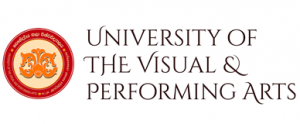
Supporting Partners

Important Dates
Announcement and Call for Papers
01 February 2021
Deadline for Abstract Submission
15 September 2021
Notification of Acceptance
31 September 2021
Opening for Registration and Payment
15 October 2021
Closing Registration and Payment
30 October 2021
The conference Dates
23-25 November 2021
Submission
Add Your Submission Here
https://www.isme-conferences.org/south-asia-submission-page.html
Programme
09:30-10:30
Opening + Keynote 1A
Emily Achieng’ Akuno
Promoting Intercultural Understanding through Music Transmission in South Asia
10:45-12:15
Presentation Session 1B
OPPORTUNITIES AND CHALLENGES IN USING MODERN TECHNOLOGIES FOR MUSIC EDUCATION
Session Chair:
Bindu Subramaniam
Sebanti Chatterjee
Tracing the Digital Life of Sounds: A Balancing Act
Shree Lakshmi Vaidyanathan
Music without Instruments in India or How my Phone and Laptop saved my Music Lessons
Nayomi Wathsala
An investigation of the Motivation Brought Towards Education & Good Virtues of Motivational Sinhalese Songs
Priyeshini Peiris Perera & Mahesha Suriyarachchi
Effects of Utilizing EmoGraphs© to Develop Emotion in Music Performances of University Music Undergraduate Students: An Experimental Pilot Study
13:45-15:45
Presentation Session 1C
THE STATUS OF MUSIC LEARNING IN PRESENT EDUCATIONAL SYSTEMS IN SOUTH ASIA (1)
Session Chair:
Ruwin Rangeeth Dias
Aditi Krishna
Celebrating Music or Redefining Heritage? Music Organisations, Education, and Hindustani Classical Music in Contemporary Delhi
Chuang Sheng-Hsuan
The Kaleidoscope of Teaching Belief: Extracting Teaching Belief of Taiwanese Community Band directors via Kelly’s Repertory Grid Technique
Roopini Ravindran
Pedagogic Challenges in Multicultural Music Education: A Case Study in the Implementation of Multicultural Music Curriculum in an International School in India
Ruchi Mishra
Indian Classical Music: A Boon to the Glorified Traditional Heritage of India
16:00-18:00
Presentation Session 1D
PROBLEMS IN CURRICULUM-BASED MUSIC EDUCATION PRACTICES
Session Chair:
Asith Atapattu
Natalie Sarrazin
Who is Teaching the Teachers? Pedagogical Practices in India’s Music Education System
Salete Chiamulera
LOS NINOS
Pamalka Karunanayake
New Techniques in Teaching Complex Elaborations of Ragas to Minors
Ranga Perera
Critical Analysis of Teaching ‘Dhir Dhir’ Composition in Tabla Using Virtual Methods
18:00-19:00
WORKSHOP 1E
ISME PROFESSIONAL
DEVELOPMENT SESSION (1)
Moderator:
Kamalinie Samarakoon
Jody Kerchner
Theme and Variations on Teachers’ Questions and Feedback
10.00 -10:30
Keynote 2A
Gisa Jähnichen
Expecting Changes in Music Education: A Reality Check for South Asia from an Eastern Perspective
10:45-12:15
Presentation Session 2B
THE STATUS OF MUSIC LEARNING IN PRESENT EDUCATIONAL SYSTEMS IN SOUTH ASIA (2)
Session Chair:
Manoj Alawathukotuwa
Rebecca Colaco & Shree Lakshmi Vaidyanathan
Music Outreach – A Tool to Foster Change in Disadvantaged Schools in Urban India
Asith Atapattu
The Influence of the Melodies of Rabindra Sangit on Ananda Samarakoon’s Songs
Nishshanka Abeyrathna
An Investigative Study of the Music Associated with the Athugalpura Raja Sabha
Vasanth Narayanan
The State of Music Education in India: Investigating Musical Complacency amongst Tamil Nadu Public Schools
12.45- 13.45
ISME PROFESSIONAL DEVELOPMENT SESSION (2)
Moderator:
Priyeshni Peiris Perera
Jo Saunders
Music Education Philosophy
Sandra Oberoi
Ethics, Creativity and Advocacy for Educators and Researchers
13:45-15:45
Presentation Session 2C
CONTINUATION OF MUSIC LEARNING FROM SECONDARY SCHOOL TO HIGHER EDUCATION
Session Chair:
Saman Panapitiya
Lin Zhi & Gisa Jähnichen
About the History of
‘The Song’
Indrani Edirisooriya
Problematic Backgrounds that Affect the Contribution of Female Instrumentalists in Sri Lanka
Rhea Samuel & Anezka Kurian
Gender and Creativity in Music Composition in the context of the Indian Education System
Vilma Timonen
Heritage on Stage: Co-constructing Future Professionalism in and from Traditional Music
16:00-18:00
Presentation Session 2D
MUSIC EDUCATION IN SRI LANKA
Moderator: Chinthaka Prageeth Meddegoda
Saman Panapitiya Higher Music Education
Nishadh Handunpathirana Primary and Secondary Music Education
Ranjith Fernando Research on Music Education
18:00-19:00
GUEST SESSION 2E
Moderator:
Natalie Sarrazin
André de Quadros
Music Making in South Asia in the Shadow of Colonialism
10.00 -10:30
Keynote 3A
Rohan Nethsinghe
Reviving South East Asian aesthetic traditions: Musicking as a method for promoting global intercultural understanding
10:45-12:15
Presentation Session 3B
CONTINUATION OF MUSIC LEARNING FROM SECONDARY SCHOOL TO HIGHER EDUCATION
Session Chair:
Nishadh Handunpathirana
Nishadi Meddegoda
Formal Secondary Music Education versus Social Philosophy: The Meaning of a Sangeeth Visharad in the Community
Rashmitha Thalakotunna
A Study on the Updating & Renewal of the Bachelor of Performing Arts Syllabus Degree Programme Regarding the Music Industry in Sri Lanka
K.M Manoj Sanjeewa
The Place of Music in the School Education of Muslim Inhabitants in Sri Lanka
Arunthathy Sri Ranganathan
Reconciliation and Harmony through Art and Culture
13.00 – 13.45
13:45-15:45
Presentation Session 3C
FORMALISATION OF ORAL MUSIC TRADITIONS THROUGH MUSIC EDUCATION IN SOUTH ASIA
Session Chair:
Ranjith Fernando
Lahiru Gimhana Komangoda
Absolute or Relative Pitches; Ambiguities in the Application of Swara in the Formal Music Education in Sri Lanka
Nishadh Handunpathirana
New teaching and learning methods for North Indian Ragadari Music
K.N.Thanuja Rukshini Karunanayake
Modern Trends of Hindustani Classical Vocal Music
16:00-18:00
Mixed Session 3D
MIXED ISSUES OF MUSIC EDUCATION IN SOUTH ASIA
Session Chair:
Priyeshni Peiris Perera
Salete Chiamulera
Technology Takes Courage
16:30-17:00
Cultural Framework
17:00 – 18:00
Guest Session
Exclusive Interview with Graham Welch on Music Education: Purpose and Practice
18:00-19:30
ISME PROFESSIONAL DEVELOPMENT SESSION (3)
Moderator: Sandra Oberoi
Gwen Moore
Publishing in the Journals
Jody Kerchner
ISME Membership
Emily Achieng’ Akuno
ISME World Conference: Thoughts and Reflections
OFFICIAL CONCLUSION
Contact
Conference organizers
ISME enquiries regarding ISME memberships